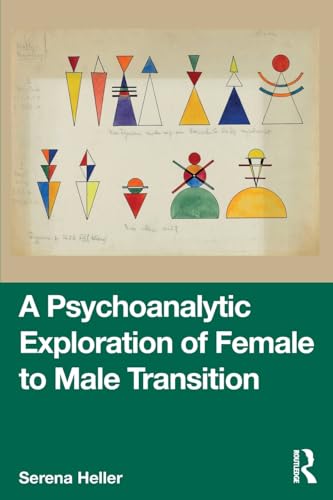
Member Publications
Our member publications are used by academics, researchers, professional psychotherapists, healthcare professionals and students globally.
Publication topics cover a breadth and depth of subjects: from introductions to psychotherapy concepts, to in-depth specialist case studies to contemporary ethical issues.
A Psychoanalytic Exploration of Female to Male Transition
Authors: Serena Heller
Publisher: Routledge
Published: 2025
Drawing on theory from a range of schools of psychoanalytic thought, this timely book addresses and explores the phenomenon of the increasing number of people who were assigned female at birth and now identify as male, and what might underlie the cultural pull to remove femaleness from self and body.
In A Psychoanalytic Exploration of Female to Male Transition, Serena Heller considers how early recognition of the difference between the sexes might evoke a melancholic attitude towards one’s anatomy, as being one sex and not the other. She considers the ramifications of the developing sexual bodies of young women at a time when they are having great difficulty accepting them, addressing the complexity of female sexual development in relation to sexual aim and object, and how manifestations of early bisexuality can resurface during puberty. Focusing solely on the experience of female-to-male transition, rather than making broad assumptions of a universal trans experience, Heller provides a depth of theoretical analysis of biological and psychic aspects of female sexuality, and trans gender identifications.
Empathetic in its approach and thorough in its conceptualisation, this volume is a vital resource for psychodynamic and psychoanalytic psychotherapists working directly with trans patients, and with those experiencing gender dysphoria and issues of sexual identity. The book assumes no prior expertise in analytic thought, and is designed to help mental health practitioners, students and researchers engaged in queer studies, gender studies and the intersection of psychoanalytic thought and gender identity.
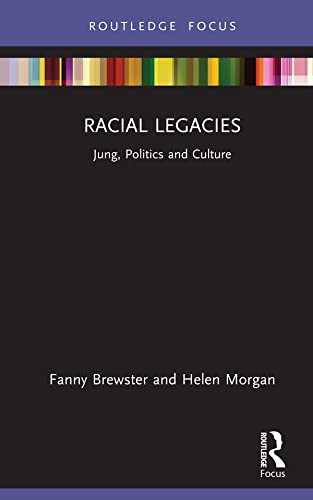
Racial Legacies: Jung, Politics and Culture (Focus on Jung, Politics and Culture)
Authors: Fanny Brewster and Helen Morgan
Publisher: Routledge
Published: 2022
This essential new book presents a discussion of racial relations, Jungian psychology and politics as a dialogue between two Jungian analysts of different nationalities and ethnicities, providing insight into a previously unexplored area of Jungian psychology.
Racial Legacies explores themes and historical events from the perspective of each author, and through the lens of psychology, politics and race, in the hopes of creating meaningful racial relationships. The historical ways the past has affected the authors’ ancestors and their own lives today is explored in detail through essays and dialogue, demonstrating that past racial legacies continue to bind on both conscious and unconscious levels.
This book distinguishes itself from other texts as the first of its kind to present a racial dialogue in the context of Jungian psychology. It will be of great value to psychoanalysts, psychotherapists, and students of Depth and Analytical Psychology.
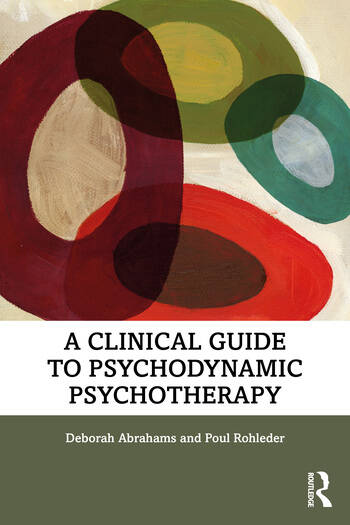
A Clinical Guide to Psychodynamic Psychotherapy
Authors: Deborah Abrahams and Poul Rohleder
Publisher: Routledge
Published: 2021
A Clinical Guide to Psychodynamic Psychotherapy serves as an accessible and applied introduction to psychodynamic psychotherapy.
The book is a resource for psychodynamic psychotherapy that gives helpful and practical guidelines around a range of patient presentations and clinical dilemmas.
It focuses on contemporary issues facing psychodynamic psychotherapy practice, including issues around research, neuroscience, mentalising, working with diversity and difference, brief psychotherapy adaptations and the use of social media and technology.
The book is underpinned by the psychodynamic competence framework that is implicit in best psychodynamic practice.
The book includes a foreword by Prof. Peter Fonagy that outlines the unique features of psychodynamic psychotherapy that make it still so relevant to clinical practice today.
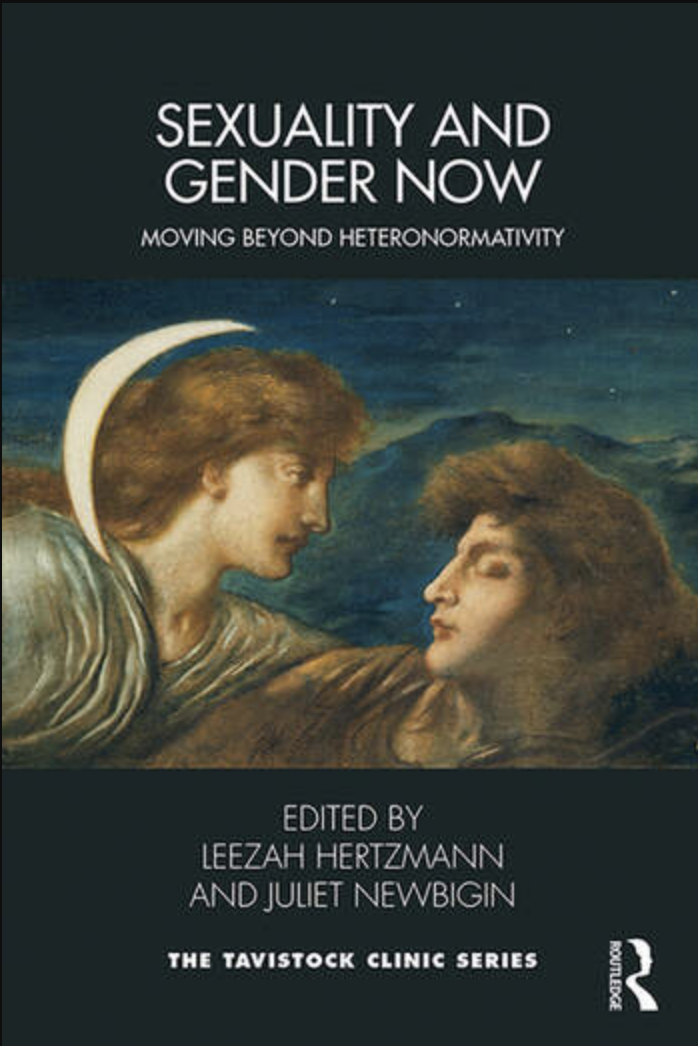
Sexuality and Gender Now – Moving Beyond Heteronormativity
Editors: Leezah Hertzmann, Juliet Newbigin
Publisher: Routledge
Published: August 2019
Sexuality and Gender Now uses a psychoanalytic approach to arrive at a more informed view of the experience and relationships of those whose sexuality and gender may not align with the heterosexual “norm”. This book confronts the heteronormative bias dominant in psychoanalysis, using a combination of theoretical and clinical material, offering an important training tool as well as being relevant for practicing clinicians.
The contributors address the shift clinicians must make not only to support their patients in a more informed and non-prejudicial way, but also to recognise their own need for support in developing their clinical thinking. They challenge assumptions, deconstruct theoretical ideas, extend psychoanalytic concepts, and, importantly, show how clinicians can attend to their pre-conscious assumptions. They also explore the issue of erotic transference and countertransference, which, if unaddressed, can limit the possibilities for supporting patients more fully to explore their sexuality and gender. Theories of psycho-sexuality have tended to become split off from the main field of psychoanalytic thought and practice or read from an assumed moral high ground of heteronormativity. The book specifically addresses this bias and introduces new ways of using psychoanalytic ideas. The contributors advocate a wider and more flexible attitude to sexuality in general, which can illuminate an understanding of all sexualities, including heterosexuality.
Sexuality and Gender Now will be essential reading for professionals and students of psychoanalysis who want to broaden their understanding of sexuality and gender in their clinical practice beyond heteronormative assumptions.
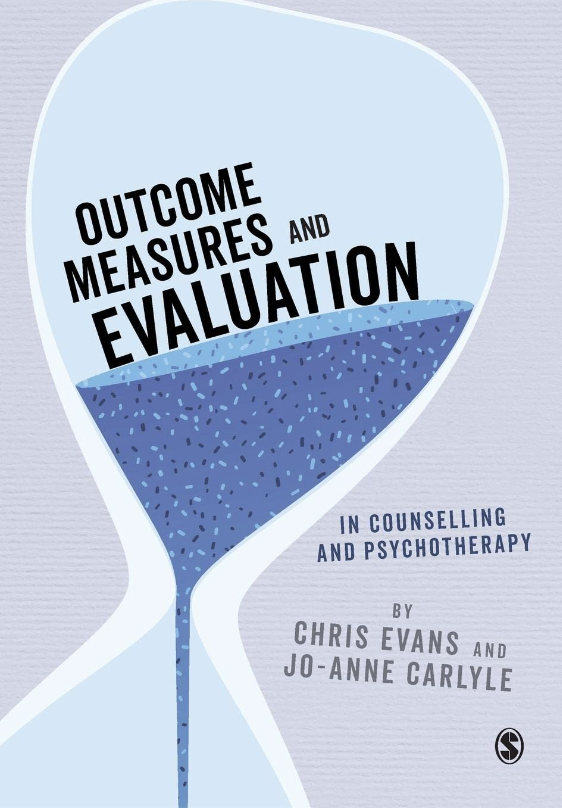
Outcome Measures and Evaluation in Counselling and Psychotherapy
Authors: Jo-Anne Carlyle & Chris Evans
Publisher: SAGE Publications Ltd
Published: April 2022
This book sets in context the role of outcome measurement research – taking you step-by-step through the research process and beyond to consider the wider professional and ethical issues involved. This book will provide you with everything you need to know and more, helping you develop the skills and knowledge you need to become a successful research-informed practitioner. Written for trainees and counselling and psychotherapy practitioners, this book:
- Provides you with a brief overview and history of research and measurement in mental health contexts.
- Sets out a framework for understanding the core features of outcome measures and their scope.
- Takes you step-to-step through the process of implementing a SMART outcome evaluation.
- Addresses the benefits and limitations of outcome measures research for the individual client, practitioner and service provider.
Packed full of case studies, activities and tools for real-life practice, this book throws a life belt to all counselling and psychotherapy trainees and practitioners looking to make the best start in their research-informed career. Chris Evans is Visiting Professor at the University of UDLA, Ecuador and an Honorary Professor at the University of Roehampton. Jo-anne Carlyle is Director of PSYCTC.com
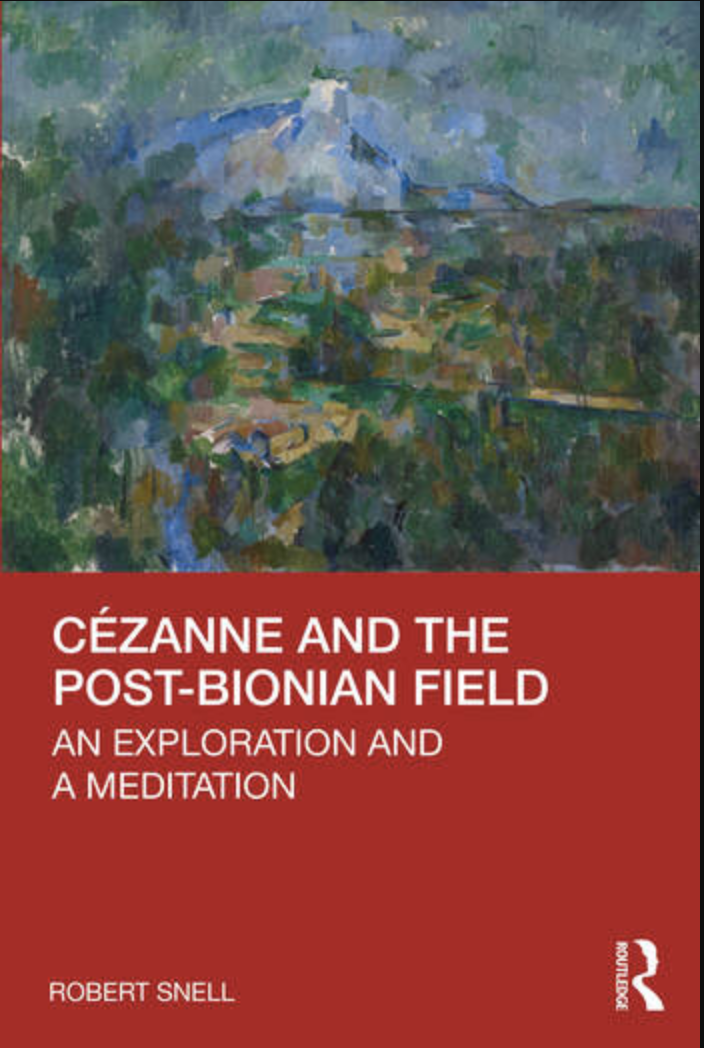
Cézanne and the Post-Bionian Field: An Exploration and a Meditation
Publisher: Routledge
Published: December 2020
By inviting a ‘conversation’ between them, this book offers a nuanced introduction both to Cezanne-the ‘father of modern art’-and perhaps the most vital body of theory in contemporary psychoanalysis, ‘post-Bionian field theory’, as it has been evolving in Italy in the hands of Antonino Ferro, Giuseppe Civitarese, and others.
Cezanne and Bion, each insisting on his own truths, spearheaded quite new directions in painting and in psychoanalysis. Both point us towards a crucial insight: far from being isolated, self-contained ‘subjects’, we fundamentally exist only within a larger interpersonal ‘field’. Cezanne’s painting can give us a direct experience of this. For the Italian field analysts, building on Bion’s work, the field is accessed through reverie, metaphor, and dream, which now come to occupy the heart of psychoanalysis. Here primitive ‘proto-emotions’ that link us all might be transformed-as Cezanne transformed his ‘sensations’-into aesthetic form, into feelings-linked-to-thoughts that in turn enrich and expand the field.
The book draws on the words of artists (Cezanne himself, Mann), philosophers (Merleau-Ponty, Bergson), art historians and theorists (Clark, Smith, Shaw), as well as psychoanalysts (Bion, Ferro, Civitarese, and others), and it is the first to focus on one particular-and seminal-painter as a way of exploring this aesthetic and ‘field’ dimension in depth and detail. Aimed at psychoanalysts, psychotherapists, artists, art historians, and the general reader, it suggests how far art and contemporary psychoanalysis are mutually generative.
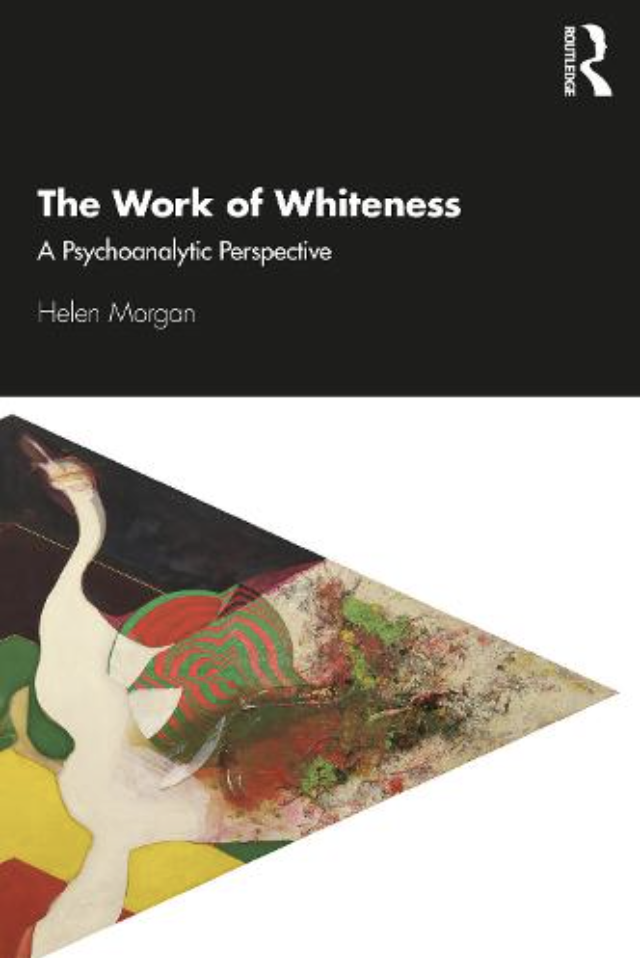
The Work of Whiteness: A Psychoanalytic Perspective
Author: Helen Morgan (bpf)
Publisher: Routledge Published: 2021
‘Whiteness’ is a politically constructed category which needs to be understood and dismantled because the system of racism so embedded within our society harms us all. It has profound implications for human psychology, an understanding of which is essential for supporting the movement for change. This book explores these implications from a psychoanalytic and Jungian analytic perspective.
The ‘fragility’ of whiteness, the colour-blind approach and the silencing process of disavowal as they develop in the childhood of white liberal families are considered as means of maintaining white privilege and racism. A critique of the colonial roots of psychoanalytic theories of Freud and Jung leads to questioning the de-linking of the individual from society in modern day analytic thinking. The concept of the cultural complex is suggested as a useful means of connecting the individual and the social. Examples from the author’s clinical practice as well as from public life are used to illustrate the argument.
Relatively few black people join the psychoanalytic profession and those who do describe training and membership as a difficult and painful process. How racism operates in clinical work, supervision and our institutions is explored, and whilst it can seem an intractable problem, proposals are given for ways forward. This book will be of great importance to psychoanalysts, psychotherapists, social workers and all those with an interest in the role of white privilege on mental health.
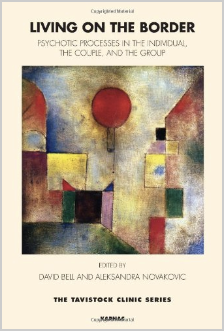
Living on the Border: Psychotic Processes in the Individual, the Couple, and the Group
Editors: David Bell & Aleksandra Novakovic (bpf)
Publisher: Karnac Books Published: 2013
This book centres on the problem of psychosis, understood from a psychoanalytic perspective, as it manifests itself in different contexts and different levels of organisation: from the individual psychoanalytic session, through work with couples, groups and institutions and wider levels of social organisation.
Beginning with a discussion of the psychoanalytic approach to psychosis centring on the work of Freud, Klein and the Post-Kleinians, it goes on to cover individual, couple and group therapy with psychotic patients.
It draws on clinical material and theoretical discussion to explore the links between psychotic processes on different levels. This work is aimed at different professionals working within the psychodynamic frame of reference: individual psychotherapists, couple and family and group psychotherapists; organisational consultants and trainees in different therapies.
As well as this it will be a useful resource to nurses, doctors and social workers who work with very disturbed patients and wish to learn about psychotic processes.
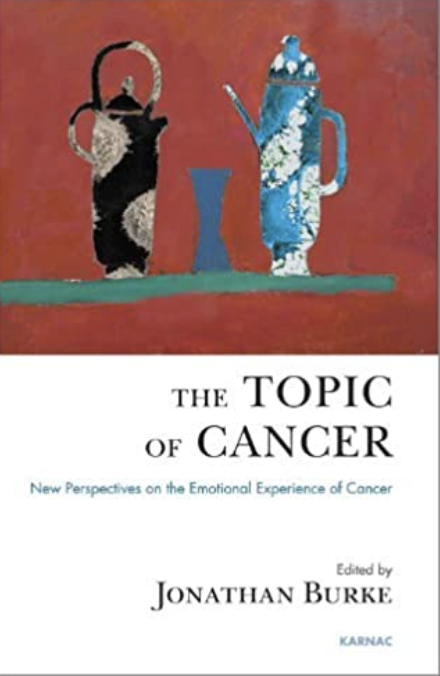
The Topic of Cancer: New Perspectives on the Emotional Experience of Cancer
Editor: Jonathan Burke
Publisher: Karnac Books Published: 2013
Topic of Cancer begins with Freud’s cancer, widely known of but rarely understood in its historic and analytic context.
Psychotherapeutic reflections are then offered on our understanding of the adult and adolescent with cancer, and the challenges of sustaining a thoughtful presence in the face of the trauma experienced when a child is diagnosed with cancer, and during treatment.
The dilemmas and challenges faced by today’s psychotherapist with cancer are explored next and, for the first time in cancer literature, an account of the emotional demands on nurses involved in sensitive, intimate care.
With an increasing number of people living longer with cancer, “survivorship” and palliative care are the focus of the chapters that follow.
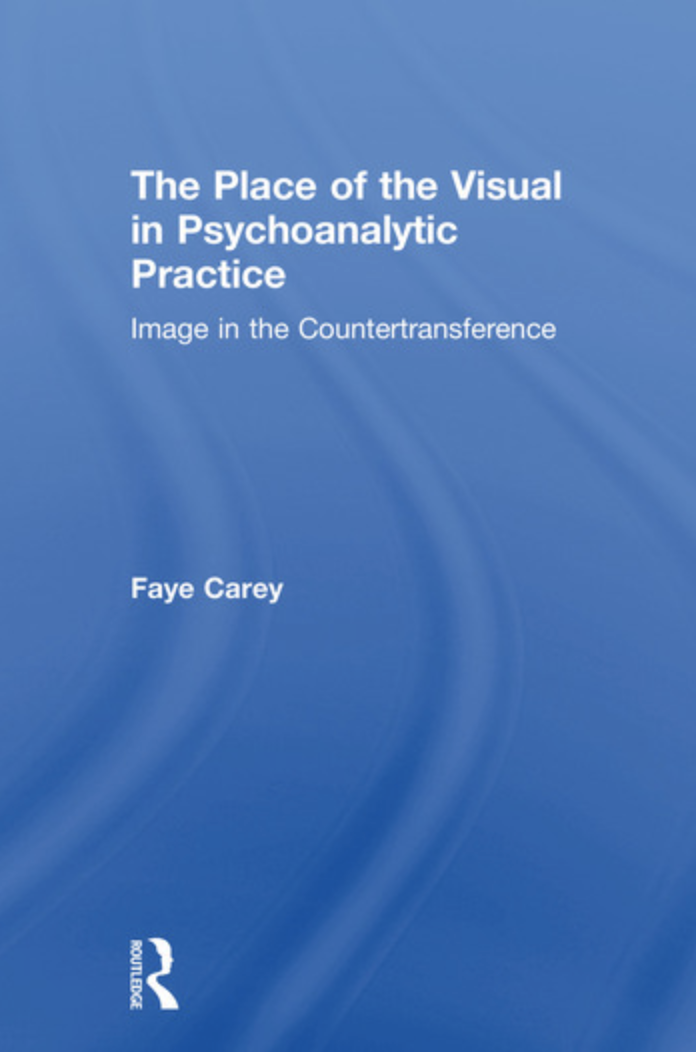
The Place of the Visual in Psychoanalytic Practice
Author: Faye Carey
Publisher: Routledge
Published: 2018
The Place of the Visual in Psychoanalytic Practice: Image in the Countertransference explores the place of the visual image in psychoanalysis and psychotherapy, a still relatively unexplored topic in the psychoanalytic literature. Though ‘talking therapies’ are necessarily structured around the use of the spoken word, it can be difficult and at times misleading to explore the unconscious through speech alone.
This book examines how it may be further understood through recognising the presence of imagery as a form of non-verbal, but valuable, means of communication. Drawing on the work of Freud, Bion, Winnicott and Ogden, alongside other British and American contributions to this infrequently addressed subject, the book examines the connection between reverie, dream and daydream and explores the reservoirs of imagery of both client and therapist, focusing mainly on the therapists’ s visual countertransference.
Covering essential theory and a wealth of clinical material, The Place of the Visual in Psychoanalytic Practice: Image in the Countertransference is a rich yet accessible guide to both recognising and using visual imagery within the clinical setting for both psychoanalysts and psychotherapists.
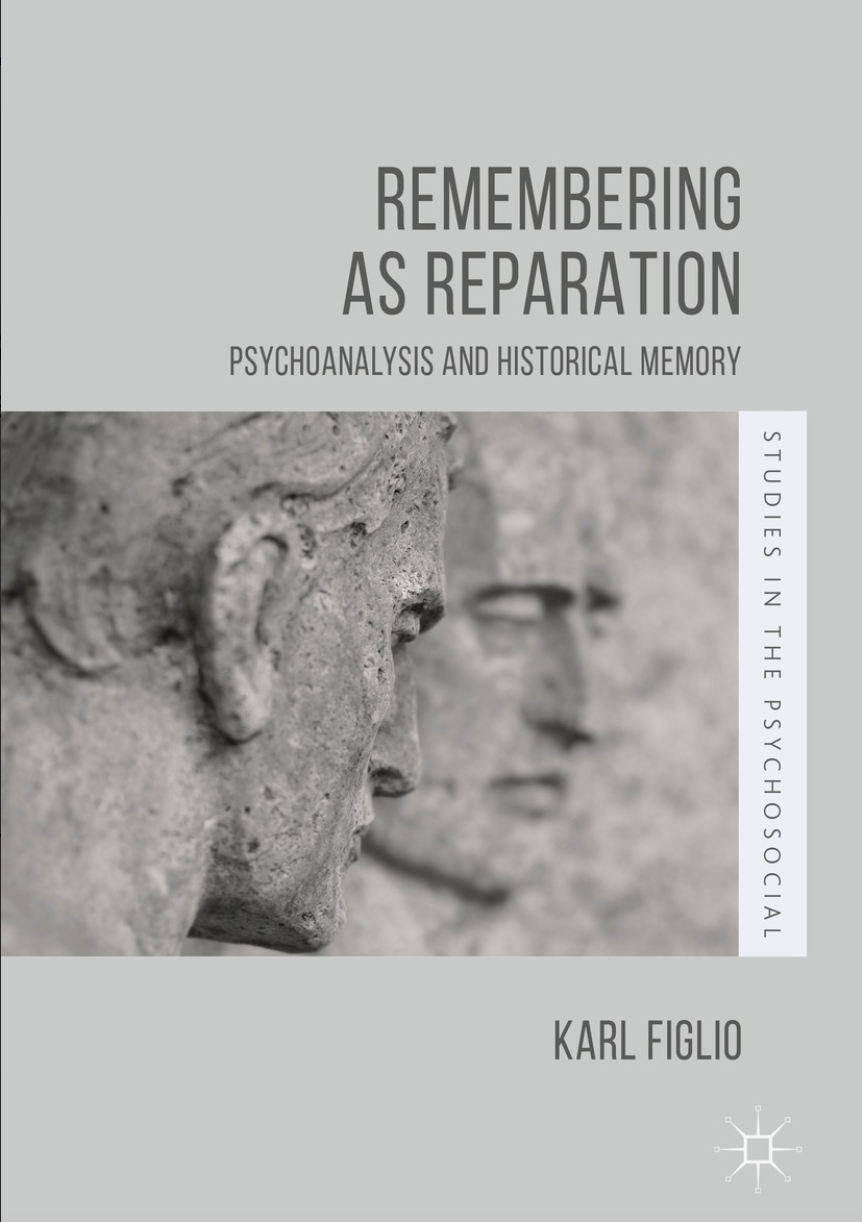
Remembering as Reparation
Author: Karl Figlio
Publisher: Palgrave Macmillan UK
Published: 2017
This book brings together psychoanalysis, clinical and theoretical, with history in a study of remembering as reparation: not compensation, but recognition of the actuality of perpetration and the remorseful urge to rejuvenate whatever represents this damage. Karl Figlio argues that this process, intensively studied by Melanie Klein, is shadowed by manic reparation, which simulates, but is antithetical, to it. Both aim for peace of mind: the former in a guilt-induced attitude of making better a damaged ‘good object’, internal and external; the latter, supported by defences thoroughly studied in psychoanalysis, in claiming liberation from an accusatory object.
This psychoanalytic line of thinking converges with historical scholarship on postwar German memory and memorialization. Remembering is posited as ambivalent – it is reparative, in ‘remembering true’, with respect and self-respect. It is also manic reparative, in ‘remembering false’, shedding bonds to the actuality of history through acts of triumph and liberation. This thoughtful book highlights new features of history and memory work, especially the importance of emotion, and will be of great value to students, academics and practitioners across the fields of psychoanalysis, memory studies, German studies and modern history.
Karl Figlio is Professor Emeritus in the Department for Psychosocial and Psychoanalytic Studies, University of Essex, UK. He is a Senior Member of the Psychoanalytic Psychotherapy Association of the British Psychoanalytic Council and an Associate of the British Psychoanalytical Society. He has published widely in the history of science, psychoanalysis and psychoanalysis and culture.
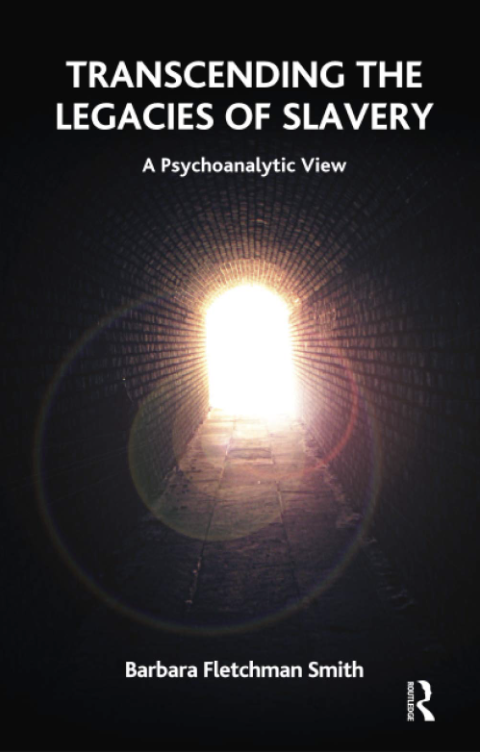
Transcending the Legacies of Slavery: A Psychoanalytic View
Author: Barbara Fletchman Smith
Publisher: Karnac Books
Published: 2011
This book puts psychological trauma at its centre. Using psychoanalysis, it assesses what was lost, how it was lost and how the loss is compulsively repeated over generations.
There is a conceptualization of this trauma as circular. Such a situation makes it stubbornly persistent. It is suggested that central to the system of slavery was the separating out of procreation from maternity and paternity.
This was achieved through the particular cruelties of separating couples at the first sign of loving interest in each other; and separating infants from their mothers. Cruelty disturbed the natural flow of events in the mind and disturbed the approach to and the resolution of the Oedipus Complex conflict.
This is traced through the way a new kind of family developed in the Caribbean and elsewhere where slavery remained for hundreds of years.
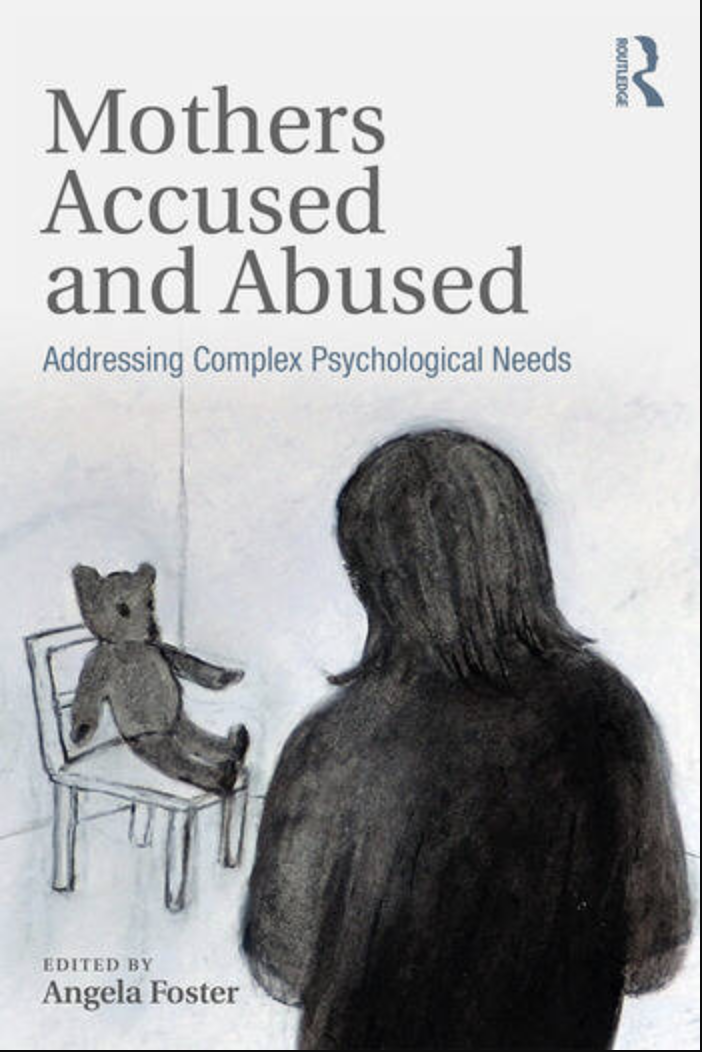
Mothers Accused and Abused: Addressing Complex Psychological Needs
Editor: Angela Foster
Publisher: Routledge
Published: 2019
“Mothers Accused and Abused: Addressing Complex Psychological Needs” brings together stories about mothers who are accused of harming and, in some instances, killing their children; stories about the children who go onto harm or kill others and about the challenges to professionals who work with them.
By recognising the long-standing, unmet dependency needs of abused and neglected women, the book argues that longer-term engagement can prevent a seemingly endless repetition of court hearings and imprisonment, and thereby put an end to cycles of neglect.
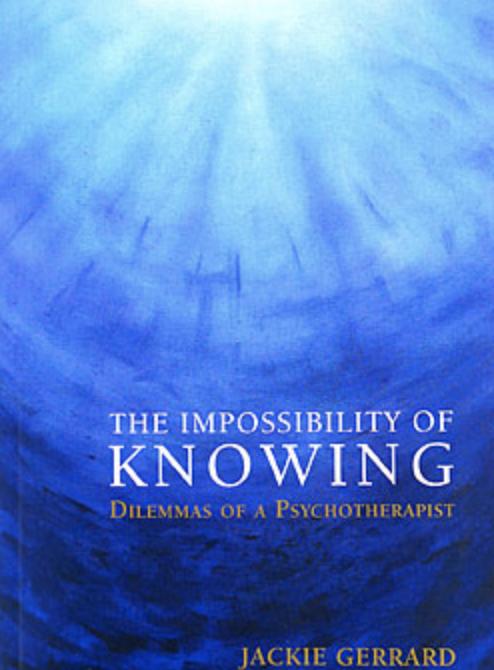
The Impossibility of Knowing: Dilemmas of a Psychotherapist
Author: Jackie Gerrard
Publisher: Karnac Books
Published: 2013
This is a book that assembles and integrates Jackie Gerrard’s clinical work and thinking over the many years of her working life.
Part I focuses on patients with specific types of psychopathology and explores particular difficulties in technique and thinking.
Part II addresses the issues of love, hate, and the erotic.
In Part III, specific challenges to the psychotherapeutic frame are demonstrated in chapters on enactments and on work with an absent patient. Richly illustrated throughout with clinical vignettes, above all, Gerrard stresses the importance of the enquiring mind and the struggle not to “know” but to be ever ready to “not know” and to explore.
The book should be of interest to qualified practitioners, to those who are training in psychodynamic or psychoanalytic work, and to anyone who has an interest in psychoanalysis and the “impossibility of knowing”.
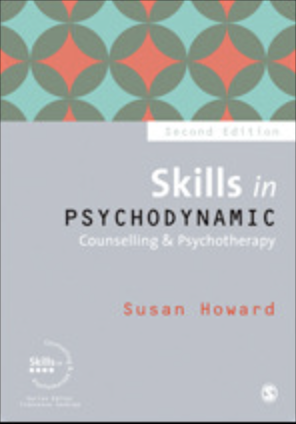
Skills in Psychodynamic Counselling & Psychotherapy
Author: Susan Howard
Publisher: Sage Publications Ltd
Published: 2017
This is a step-by-step guide to the key skills and techniques of the psychodynamic approach used at each stage of the therapeutic process. Updated in a second edition, the book includes a new chapter on neuropsychology and its implications for theory and practice, new content on working in the NHS and other settings, additional case material and updates to all chapters reflecting recent literature, research and understanding.
Susan Howard is Consultant Clinical Psychologist and Psychoanalytic Psychotherapist. She works on the Clinical Psychology training course at the University of Surrey, and in private practice as a psychoanalytic psychotherapist and supervisor.
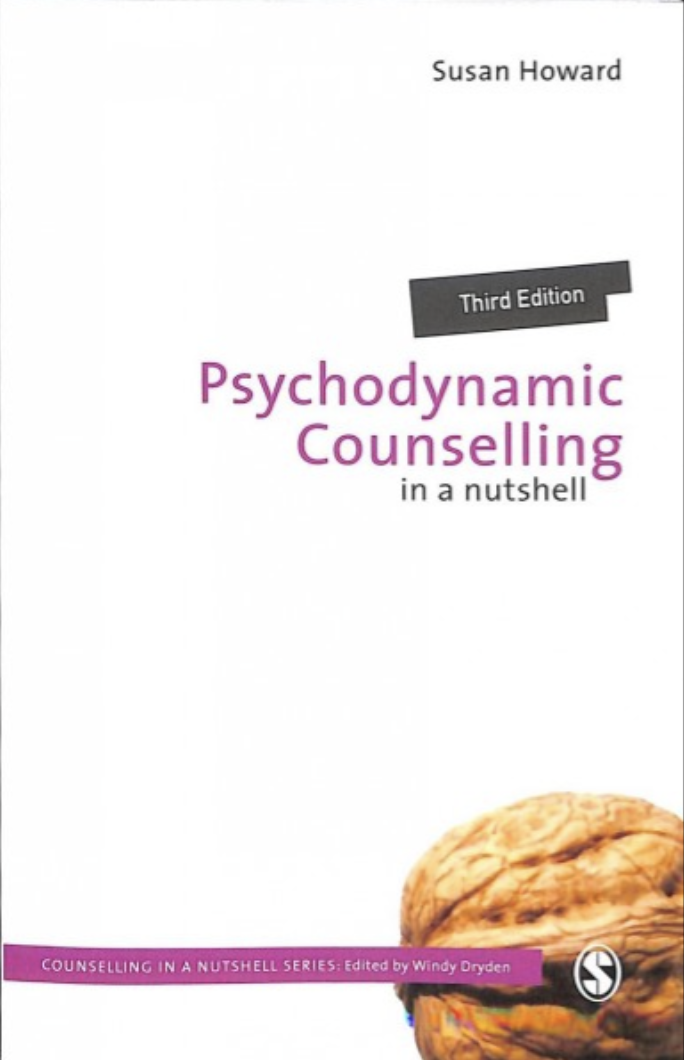
Psychodynamic Counselling in a Nutshell
Author: Susan Howard
Publisher: SAGE Publications Ltd
Published: 2011
Psychodynamic Counselling in a Nutshell explains in clear, jargon-free style, the concepts at the heart of the psychodynamic approach, and, drawing on case material, describes the therapeutic practice which rests on those ideas. Assuming no previous knowledge of the subject, the book introduces:
- The history of the approach,
- The key main concepts, and
- Practical techniques used by practitioners
In the first chapter, the author introduces a client, John, whose case is revisited throughout the book, connecting together theory and practice for the reader.
This new and revised edition also now includes new material on supervision, ethics, and Jung, and on outcome research and the most recent developments in the field.
Psychodynamic Counselling in a Nutshell is the ideal place to start for anyone reading about the psychodynamic approach for the first time.
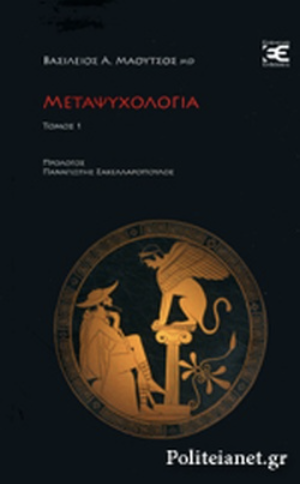
Metapsychology (First Volume)
Author: Vassilis Maoutsos
Publisher: Epekeina Publicatios
Published: 2016
Starting from Freud’s ‘Project’ and throughout his twenty three volumes of the Standard Edition there are scattered references to ‘Metapsychology’. Indeed, looking closely at his whole work one could conclude that all of it is imbued with a profound metapsychological thinking that is not always coherent and consistent with clinical facts. It was though very unfortunate that transference and counter-transference issues hindered the emergence of Freud’s detailed account of conceptualizing mental phenomena. We can easily see those difficulties in all his clinical cases even as early as with ‘Dora’ where the economic, topographic and dynamic aspects that are raised had they been treated according to those transferential parameters would have had much better therapeutic results. Actually, it is possible that the emergence of so many psychoanalytical approaches during the decades following Freud might well be nothing else but an attempt to clarify all those unfinished concepts that Freud left hanging and those unspoken meanings that were still vague and probably would not have been understood at his time. The present volume written in Greek deals with all the above issues and it is the first out of four (the second will appear in October 2018) in which every single Freudian work – with the exemption of his correspondence – is studied from a purely metapsychological perspective and in a systematic way. It includes the works of Volumes I – VI. In addition, throughout the book there is an attempt to show why principles like those of ‘homeostasis’ or the tendency towards ‘point zero’ acquire besides their theoretical value an important clinical one.
Vassilis Maoutsos M.D was trained at Fulbourn and Addenbrookes psychiatric hospitals in Cambridge (England). He was involved in Cambridge and London Universities and worked at the Ingrebourne Centre (Essex), mainly with psychotic patients. He served for some years as a member of the BAP Council. His first book was the ‘Invisible Human Brain’ (1984). Since his return to Greece in 1990 he has worked psychoanalytically in private practice as well as a supervisor, organizer and lecturer of Psychotherapy Courses in Ioannina and Alexandroupolis Training Psychiatric Units (Greece). He is the founding member of the Institute of Classical Psychoanalysis where he teaches at its training courses. He is also a member of the British Psychotherapy Foundation, British Psychoanalytic Association, British Psychoanalytic Council and International Psychoanalytic Association.
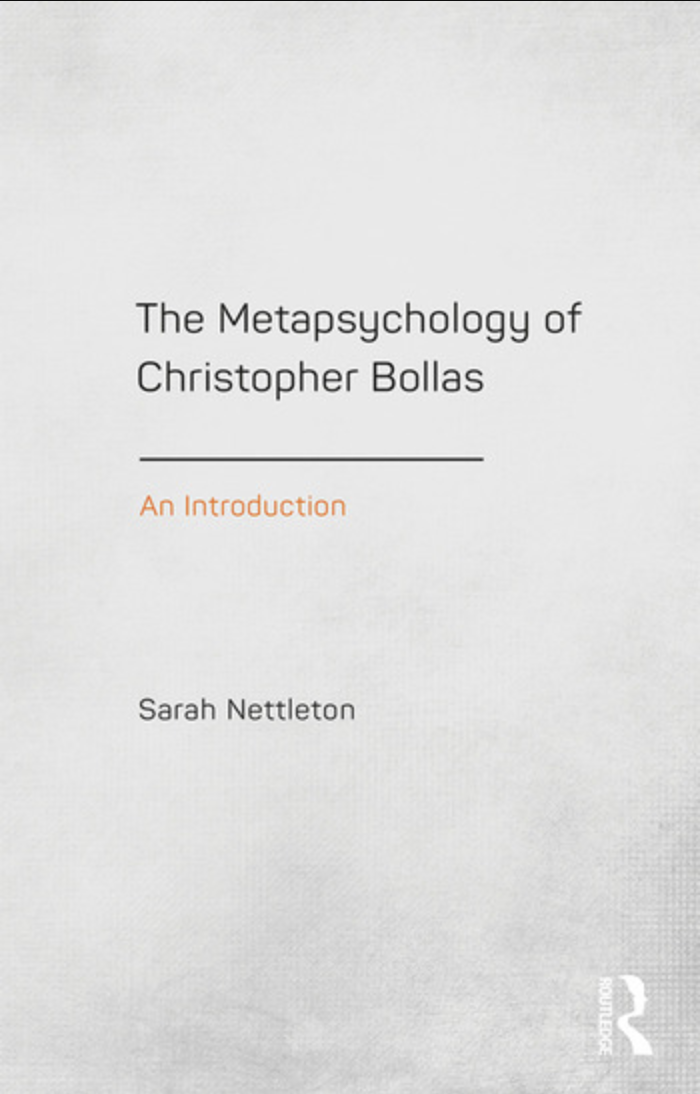
The Metapsychology of Christopher Bollas
Author: Sarah Nettleton
Publisher: Routledge
Published: 2016
Christopher Bollas has made an extraordinarily wide contribution to contemporary psychoanalysis. The book aims to introduce and explain the fundamentals of Bollas’s theory of the mind in a systematic way, addressing many of the questions that commonly arise when people approach his work.
Through chapters on topics such as the receptive subject, the creative unconscious and the implications of Bollas’s metapsychology for the technique of free association, the book enables the reader to acquire an understanding of his unique psychoanalytic language, to grasp the conceptual building blocks of his thinking and how these interrelate, and to appreciate the theoretical and clinical coherence of his thinking.
This work will be of use to psychoanalysts, psychotherapists and counsellors, as well as psychiatrists, psychologists and social workers wishing to explore the applications of psychoanalytic thinking to their practice. It will be of great value to trainees in these disciplines, as well as to postgraduate students and academics interested in contemporary psychoanalysis.
Sarah Nettleton is a psychoanalyst in London. She is a member of the British Psychotherapy Foundation, the British Psychoanalytic Association and the International Psychoanalytical Association. She has given lectures and post-graduate seminars on the work of Bollas extensively in the UK, and in Norway, Israel, France, America, Turkey, Mexico and India.
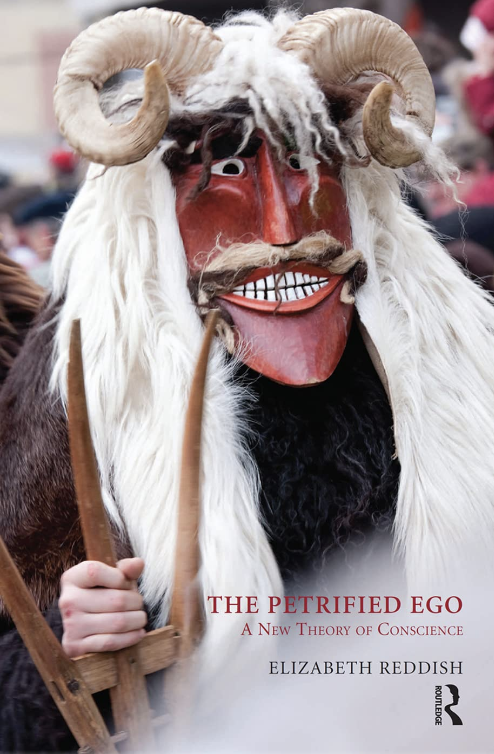
The Petrified Ego: A New Theory of Conscience
Author: Elizabeth Reddish
Publisher: Karnac Books
Published: 2013
Due to the inherent contradiction in Freud’s concept of the Superego, there is a gap in our psychoanalytic understanding of how conscience evolves. This distinction is essential for the successful treatment of patients dominated by a harsh Superego and provides valuable insight into how contemporary society evaluates moral decisions.
The Petrified Ego argues for a revision of psychoanalytic theory to include instinct as the primary form of morality. It makes the case that our earliest, infantile notion of ‘good’ and ‘bad’ is rather founded on experiences which have been ‘safe or ‘threatening’. More often than not, this is the basis of our moral judgement of others.
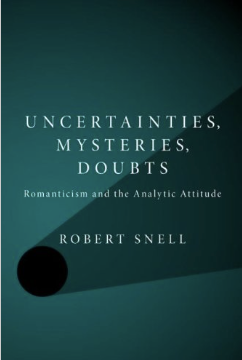
Uncertainties, Mysteries, Doubts: Romanticism and the Analytic Attitude
Author: Robert Snell
Publisher: Karnac Books
Published: 2013
What is it to listen? How do we hear? How do we allow meanings to emerge between each other?
This book is about what Freud called freely or evenly suspended attention, a form of listening, a kind of receptive incomprehension, which is fundamental and mandatory for the practice of psychoanalysis and psychotherapy. The author steps outside the usual parameters of psychoanalytic writing and explores how works of art and literature which elicit and require such listening began to appear in Europe, in abundance, from the late eighteenth-century onwards.
Uncertainties, Mysteries, Doubts is a timely reminder, in the present era of audit and manualisation, of some of psychoanalysis’s deep and living cultural roots. It hopes- by immersing the reader in the emotional, critical and contextual worlds of some artists and poets of Romanticism – to help psychotherapists, psychoanalysts, and counsellors in the endless challenge of staying open to their clients and patients, faced as we all are, therapists and clients alike, by multiple pressures to knowledgeable closure.
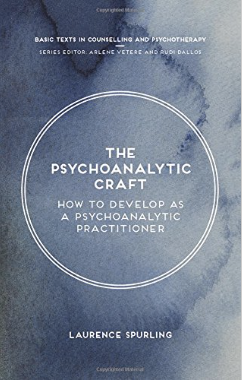
The Psychoanalytic Craft: How to Develop as a Psychoanalytic Practitioner
Author: Laurence Spurling
Publisher: Palgrave Macmillan
Published: 2015
Why is developing as a psychoanalytic practitioner so often laden with anxiety? A simple answer is that psychoanalytic work is intrinsically complex and difficult. But Laurence Spurling argues traditional accounts of practice make these difficulties even worse for students and practitioners: he shows that case descriptions and examples in psychoanalytic textbooks often give a misleading picture of practice, because they explore what practitioners ought to do rather than what they actually do.
‘The Psychoanalytic Craft’ uniquely identifies and explores what is missing in these accounts of therapy, namely the ‘craft’ aspects of skilled psychoanalytic work: how theories and models are actually used in practice, what kind of reasoning is employed in conducting a session, how interventions are composed and evaluated. The book draws on recent research, as well as the wider craft literature to show how these features of clinical thinking, which normally operate below the level of awareness, can be identified and explored in clinical practice, in supervision and in teaching.
This book has been written specifically for those students and practitioners moving beyond beginner level towards skilled and resourceful practice.
Laurence Spurling is a practising Psychoanalytic Psychotherapist in London and a Senior Member of the British Psychotherapy Foundation. He is Senior Lecturer in Psychosocial Studies at Birkbeck College, University of London, where he co-ordinates and teaches on the counselling and psychotherapy training programmes, and is a Consultant Adult Psychotherapist for the East London NHS Mental Health Trust. He has published widely on clinical issues.
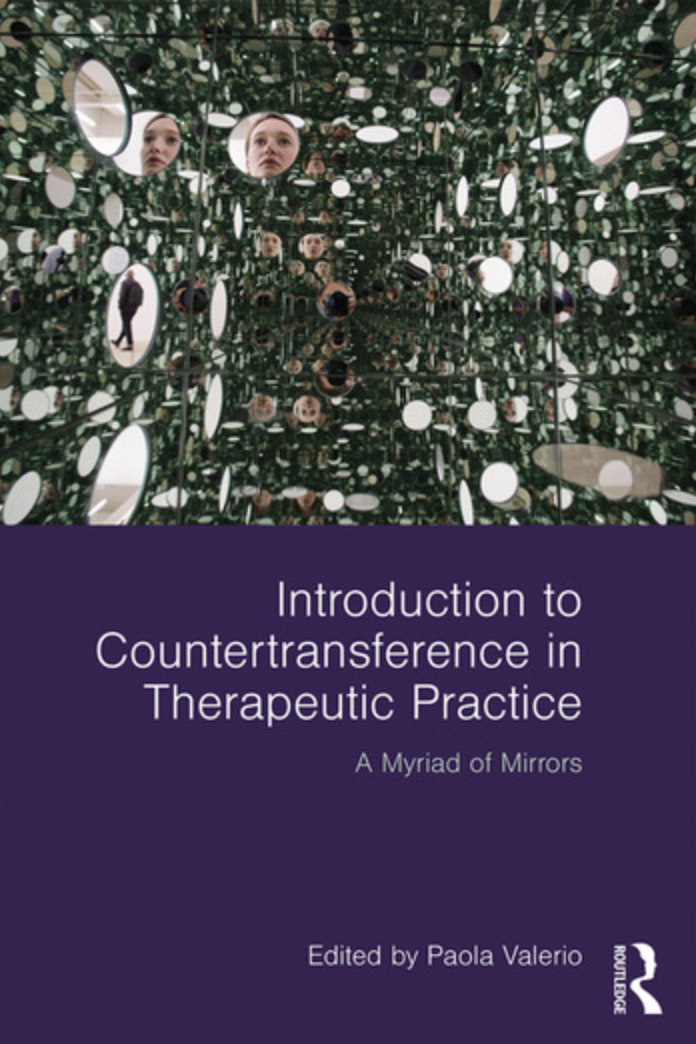
Introduction to Countertransference in Therapeutic Practice
Editor: Paola Valerio
Publisher: Routledge
Published: 2018
While transference has been fully described in the literature, countertransference has been viewed as its ugly sibling, and hence there are still not as many reflective accounts or guidance for trainees about how to handle difficult emotions, such as shame and envy and conflict in the consulting room. As a counterpoint, this book provides an integrative guide for therapists on the concept of countertransference, and takes a critical stance on the phenomenon, and theorising, about the “so-called” countertransference, viewing it as a framework to explore the transformative potential in managing strong emotions and difficult transactions.
With an explicit focus on teaching, this book informs therapeutic practice by mixing theories and case studies from the authors’ own clinical and teaching experiences, which involves the reader in case studies, reflection and action points. Countertransference is explored in a wide range of clinical settings, including in reflective practice and in research in the field of therapy, as well as in art therapy and in the school setting. It also considers countertransference in dream interpretation, in the supervision and teaching environment and in work with groups and organisations.
‘Introduction to Countertransference in Therapeutic Practice’ offers psychotherapists and counsellors, both practicing and in training, a comprehensive overview of this important concept, from its roots in Freud’s work to its place today in a global, transcultural society.
Paola Valerio is a BPC/UKCP reg. psychotherapist and senior lecturer at Roehampton University, where she convenes the psychodynamic theory and practice module on the Psych. D. She has been a visiting lecturer and supervisor in psychotherapy at Regents’ College, Surrey and Kent Universities and at the Tavistock and East London University.
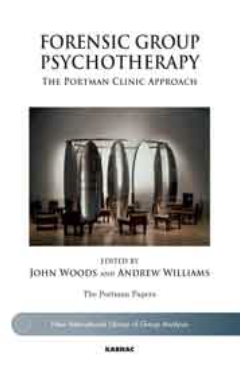
Forensic Group Psychotherapy: The Portman Clinic Approach
Editor: John Woods & Andrew Williams
Publisher: Karnac Books
Published: 2014
This collection of papers by Portman therapists provides a comprehensive account of theoretical and practical approaches to the group treatment of patients who present with problematic sexual behaviour, criminality, and violence.
The first section of the book focuses upon key aspects of group analytic theory as applied to clinical work with forensic patients and describes how to provide a setting in which treatment can proceed. This is followed by a series of chapters with a clinical emphasis, providing a rich and evocative account of the challenges of working with forensic patients in groups.
The guiding principle is the need to understand and work with the victim within the perpetrator. This book is a must for any clinician working with forensic patients in groups. Though based on the work of an outpatient clinic, there are ideas and techniques that can be applied to many other settings, including prison, probation, and inpatient.
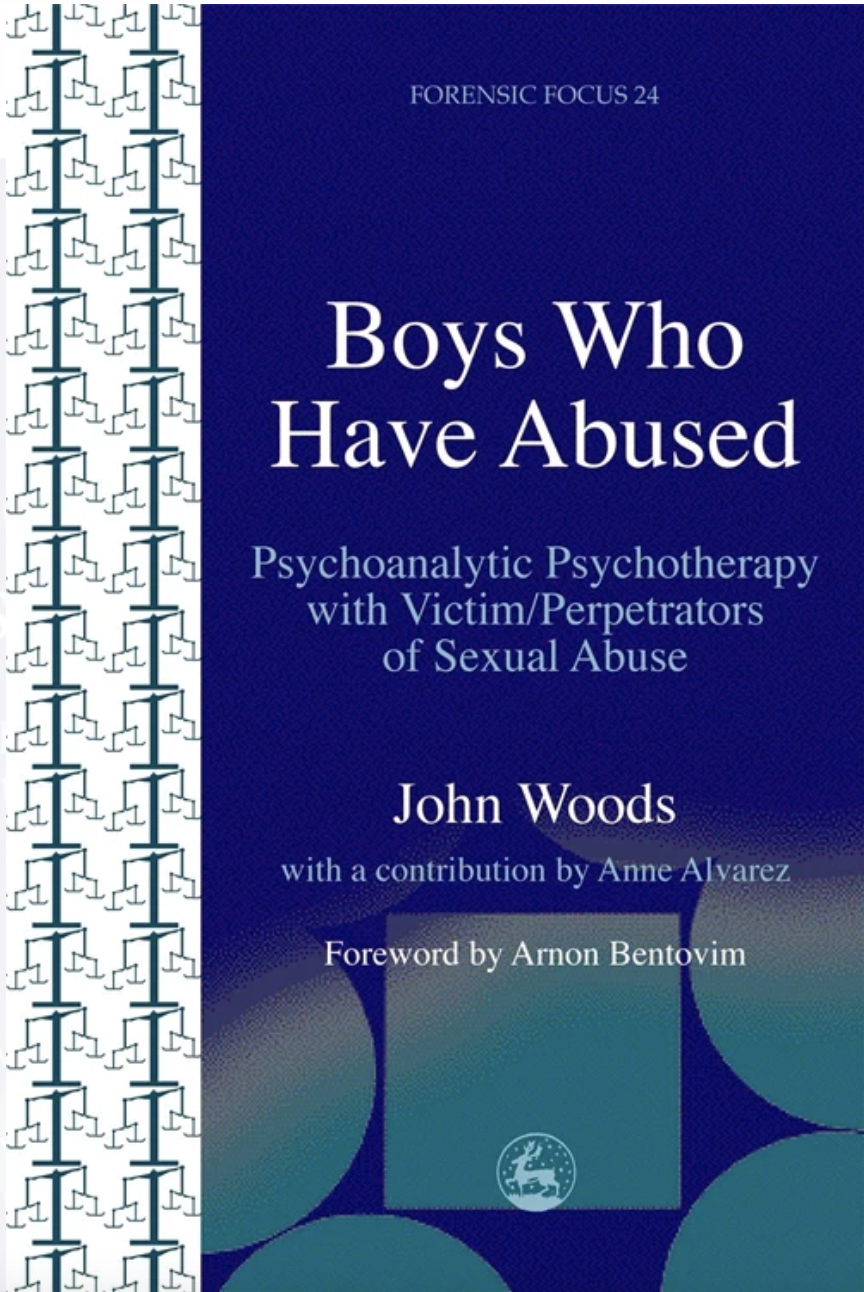
Boys Who Have Abused
Author: John Woods
Publisher: Jessica Kingsley Publishers
Published: 2003
This book portrays a theoretical approach to the subject which includes practical suggestions for mental health practitioners working therapeutically with young people who have abused. Drawing on his long-standing experience, the author has developed an integrated theory that bridges the gap between existing cognitive behavioural and psychoanalytic approaches. He shows how this individual treatment model can be applied in a range of contexts including residential settings, group and family work, as well as in individual work.
In-depth case studies throughout the book demonstrate how exploring the individual’s whole life-course within a psychoanalytic framework enables connections to be drawn between the trauma of earlier childhood experiences and subsequent abusive behaviour. Guidelines are presented on working with the problems of self-destructiveness, masochism and depression facing the young abused/abuser and the impact of sexual abuse on sexuality, gender identity and sexual orientation.
